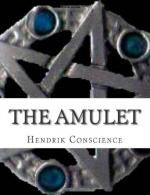“And you played at dice?” said Turchi.
“I think I did; for the rattling of the dice still sounds in my ears.”
“And the money? the two hundred crowns?”
“Be quiet, signor, on that point. I ask you for nothing. What business is it of yours that I have spent or lost a few pieces of gold, provided I leave for Germany to-morrow at daybreak?”
Simon Turchi was like one frenzied.
“Yes,” he exclaimed, “and at the first tavern you meet on the way you will drown your senses with drink, and you will squander my money.”
“Not so, signor; rely upon me—I will leave to-morrow morning at daybreak, and if I drink on the way it will only be to quench a burning thirst.”
Simon Turchi’s eye shone with a sudden and mysterious light, excited by some secret thought. He became calm, and shrugging his shoulders, said quietly, as though he submitted with resignation to the contradictions which he could not avoid:
“I ought, Julio, to punish your want of fidelity. If the bailiff had come here to-day, as I expected, your culpable neglect of duty would have placed us both in the hands of justice. Fortunately the visit will not be made before noon to-morrow. As your negligence has had no evil consequences, I fully pardon you, upon condition that you leave the city before sunrise, and that you travel without stopping until you reach the Rhine.”
“Never fear this time, signor,” replied Julio. “I will pass the night here, and at early dawn I will be beyond the city gate. In the first village I will buy a horse, and I will make such speed that he who would catch me must needs have wings.”
He yawned, stretching his arms above his head, and said:
“I am overpowered by fatigue and sleep. If you have no other directions to give, permit me, signor, to go to bed, that I may be ready for the morning.”
“Then I may rely upon you, Julio?”
“Have no anxiety about my journey; the rising sun will not find me at Antwerp.”
“Are you certain?”
“As certain as I am that a halter hangs over my head, and over yours something quite as disagreeable.”
This jest of his servant made Turchi convulsively contract his lips, but he restrained any expression of feeling, and arose, saying:
“Julio, would you like a glass of good Malmsey?”
“Ah, signor,” replied the servant, “I was just thinking that a cup of Malmsey would relieve my parched throat, when, lo! my desire finds an echo in your heart.”
“One single glass—a parting bumper.”
“One or many, signor, as you wish—either will be welcome; but the excellent wine locked in the cupboard of your room will be particularly acceptable.”
“Well, Julio, come with me, and we will drink to the happy termination of your journey.”
He arose, traversed a passage, and ascended to the upper story. The servant followed him staggering, and trying to steady himself by the wall.




